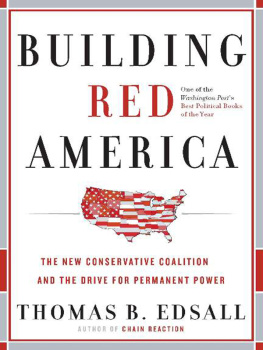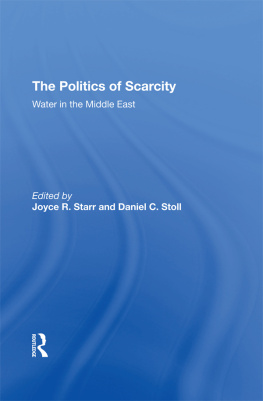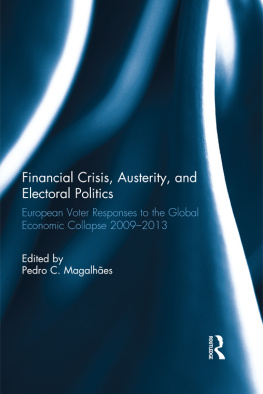Thomas Edsall - The Age of Austerity: How Scarcity Will Remake American Politics
Here you can read online Thomas Edsall - The Age of Austerity: How Scarcity Will Remake American Politics full text of the book (entire story) in english for free. Download pdf and epub, get meaning, cover and reviews about this ebook. genre: Politics. Description of the work, (preface) as well as reviews are available. Best literature library LitArk.com created for fans of good reading and offers a wide selection of genres:
Romance novel
Science fiction
Adventure
Detective
Science
History
Home and family
Prose
Art
Politics
Computer
Non-fiction
Religion
Business
Children
Humor
Choose a favorite category and find really read worthwhile books. Enjoy immersion in the world of imagination, feel the emotions of the characters or learn something new for yourself, make an fascinating discovery.

- Book:The Age of Austerity: How Scarcity Will Remake American Politics
- Author:
- Genre:
- Rating:4 / 5
- Favourites:Add to favourites
- Your mark:
- 80
- 1
- 2
- 3
- 4
- 5
The Age of Austerity: How Scarcity Will Remake American Politics: summary, description and annotation
We offer to read an annotation, description, summary or preface (depends on what the author of the book "The Age of Austerity: How Scarcity Will Remake American Politics" wrote himself). If you haven't found the necessary information about the book — write in the comments, we will try to find it.
Thomas Edsall: author's other books
Who wrote The Age of Austerity: How Scarcity Will Remake American Politics? Find out the surname, the name of the author of the book and a list of all author's works by series.
The Age of Austerity: How Scarcity Will Remake American Politics — read online for free the complete book (whole text) full work
Below is the text of the book, divided by pages. System saving the place of the last page read, allows you to conveniently read the book "The Age of Austerity: How Scarcity Will Remake American Politics" online for free, without having to search again every time where you left off. Put a bookmark, and you can go to the page where you finished reading at any time.
Font size:
Interval:
Bookmark:
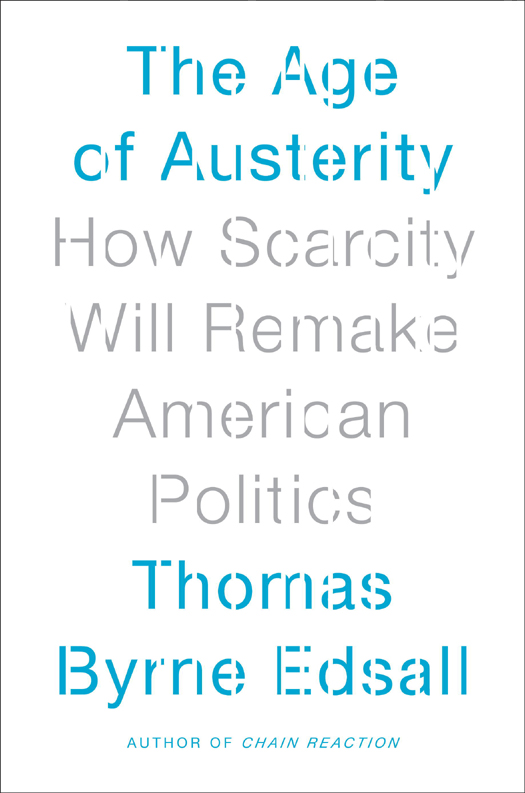
Building Red America: The New Conservative Coalition and the Drive for Permanent Power
Chain Reaction: The Impact of Race, Rights, and Taxes on American Politics, with Mary Edsall
Power and Money: Writing About Politics
The New Politics of Inequality
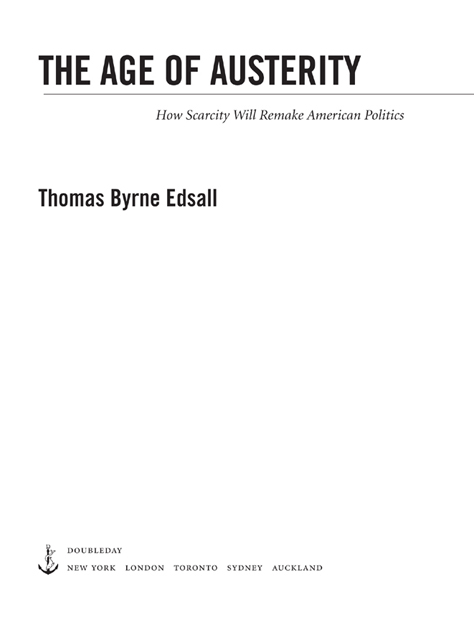
Copyright 2012 by Thomas Byrne Edsall
All rights reserved. Published in the United States by Doubleday, a division of Random House, Inc., New York, and in Canada by Random House of Canada Limited, Toronto.
www.doubleday.com
DOUBLEDAY and the portrayal of an anchor with a dolphin are registered trademarks of Random House, Inc.
constitute an extension of this copyright page.
Charts and graphs by Mapping Specialists, Ltd.
Jacket design by Emily Mahon
LIBRARY OF CONGRESS CATALOGING-IN-PUBLICATION DATA
Edsall, Thomas Byrne.
The age of austerity : how scarcity will remake American politics / Thomas Byrne Edsall. 1st ed.
p. cm.
Includes bibliographical references and index.
1. Divided governmentUnited States. 2. Political partiesUnited States. 3. Social conflictUnited States. 4. United StatesPolitics and government. I. Title.
JK2261.E37 2012
320.973dc23
2011029939
eISBN: 978-0-385-53520-5
v3.1
To those who, in an age of austerity, have provided me with an abundance of joymy wife Mary, my daughter Alexandra Tileston Victor Edsall, her husband Robert Salomon Victor, my grandson Thomas Edsall Victor, and my granddaughter Lydia Edsall Victor.
The Noose
Austerity
The Moral Underpinnings of Partisan Conflict, Part I
The Moral Underpinnings of Partisan Conflict, Part II
The Economics of Immigration
Race
Brutality, Coarseness, and the Fracture of American Politics
The Big One
This book will argue that the broad, tacit compromise of long standing between one political party promoting a social safety net and the other party asserting that hard-earned tax dollars unjustly finance those benefits is no longer sustainable. That compromise between right and left required a growing economy to fund an array of social programs while keeping taxes relatively low in order to moderate hostilities in a politically charged resource war.
Now we have entered a period of austerity markedly different from anything we have seen before. The two major political parties are enmeshed in a death struggle to protect the benefits and goods that flow to their respective bases, each attempting to expropriate the resources of the other. A brutish future stands before us.
A taste of that brutish future arrived in August of 2011. On August 2, a Republican Congress successfully forced House and Senate adoption of $2.2 to $2.5 trillion in spending cuts over ten years. The
There are clear consequences to these actions.
First, the cuts, painful as they are to various constituencies, are inadequate to resolve the danger of long-term debt.
Second, the very ineffectiveness of the 2011 Budget Act in addressing long-term debt ensures that austerity will continue to dominate public discourse. My guess is that we are entering into a decade of fiscal retrenchment, so that this wont be the only Congress that makes austerity a political imperative, said
Third, in the short term such cuts threaten to undermine already anemic economic growth.
Fourth, insofar as austerity towers above all other issues, the prospects for the political system to deliver significant long-term stimulus to break increasingly structural unemployment are diminished.
The politics of retrenchment have, in effect, placed politicians in a vise, exacerbating the struggle for smaller pieces of a shrinking pie. Each party has veto power over policy, and the two parties share little or no common ground. Each party is guided by an ideology, and a profoundly ingrained value system, diametrically opposed to that of the other.
Republicans believe government and
Paradoxically, many, if not most, voters hold internally contradictory views on the role of governmentstrongly supportive of major deficit reduction while opposed to paring back the most costly and fast-growing programs from which they themselves benefit. When pressed on specifics, the public has no stomach for the kind of fiscal consolidation that would rein in the growth of long-term debt.
Gallup, for example, found in an April 2011 survey that 73 percent of respondents blamed the deficit on government spending too much money on federal programs that are either not needed or wasteful.
Such apparently contradictory views grow out of a set of underlying beliefs, widely espoused but most firmly held by those on the right: that government disproportionately benefits the undeserving poor, and that government benefits can undermine work incentives and the drive to improve ones economic position.
These beliefs, which are explored in later chapters, are evident in survey data revealing the issues on which Tea Party supporters hold much stronger views than the general public. An April 512, 2010, New York Times poll found, for example, that 27 percent of all voters are convinced that the
As Congress struggles to balance the competing interests of the poor, on the one hand, and of middle-class beneficiaries, on the otherof Republican budget hawks on the right, and of Democratic redistributionists on the leftit is fast running out of accounting manipulations, budgetary maneuvers, and other mechanisms to mask red ink. Legislators have adopted year-by-year temporary laws to extend the Bush tax cuts, to avoid reducing the level of Medicare payments to doctors, and to prevent the
In the midst of the current great contractionwith sustained high levels of
I mmediately after the August 2011 enactment of the debt ceiling legislation, the White House struggled to put the best face on what was clearly a defeat at the hands of the GOP. On August 4, the
The August 2011 debt ceiling deal was not treated as a win by Wall Street and the market. On August 5, Standard & Poors lowered its rating of U.S. debt from AAA to AA+. S&Ps rationale for the downgrade accurately described the state of American politics, and, by specifically citing the use of threats of default as bargaining chips in the debate over fiscal policy, placed much of the onus for the downgrade on the GOP. The S&P released a communiqu on the day of the downgrade, noting that:
The political brinksmanship of recent months highlights what we see as Americas governance and policymaking becoming less stable, less effective, and less predictable than what we previously believed. The statutory debt ceiling and the threat of default have become political bargaining chips in the debate over fiscal policy. Despite this years wide-ranging debate, in our view, the differences between political parties have proven to be extraordinarily difficult to bridge, and, as we see it, the resulting agreement fell well short of the comprehensive fiscal consolidation program that some proponents had envisaged until quite recently.
Font size:
Interval:
Bookmark:
Similar books «The Age of Austerity: How Scarcity Will Remake American Politics»
Look at similar books to The Age of Austerity: How Scarcity Will Remake American Politics. We have selected literature similar in name and meaning in the hope of providing readers with more options to find new, interesting, not yet read works.
Discussion, reviews of the book The Age of Austerity: How Scarcity Will Remake American Politics and just readers' own opinions. Leave your comments, write what you think about the work, its meaning or the main characters. Specify what exactly you liked and what you didn't like, and why you think so.


